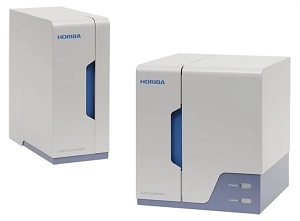A-TEEMTM (simultaneous Absorbance, Transmittance, and Fluorescence Excitation-Emission-Matrix (EEMs) Acquisition) Molecular Fingerprinting is an advanced optical technology appropriate for comprehensive component analysis in several QC/QA applications, including water, wine, pharmaceuticals, and others.
It is a simple, rapid, “column-free” spectroscopic approach that simultaneously evaluates the absorbance, transmittance, and fluorescence of substances in solution. It has distinct advantages over traditional analytical techniques, such as chromatography, mass spec, IR, etc.
This technique works best with samples in a solution that contains fluorescing components, such as an aromatic molecule, although it can also identify non-fluorescing species by absorbance. Fluorescence EEM fingerprinting has also been used on solids and skin.
Compared to other spectroscopic techniques, such as absorbance, FTIR, and Raman, fluorescence is a very sensitive approach, and the three-dimensional nature of the data gives a superior foundation for complicated component analysis.
A-TEEM spectroscopy relates to the capability to concurrently acquire a particular sample's absorbance, transmittance, and a fluorescence excitation emission matrix (A-TEEM). HORIBA invented this method with its patented Aqualog system, which integrates A-TEEM spectroscopy with multichannel CCD detection to produce rapid results.
The A-TEEM approach requires no sample preparation beyond a simple dilution, and the low cost and convenience of the use of an A-TEEM spectrometer allow it to be employed in both the research lab and at-line or in-line in a manufacturing process.
It is a column-free chromatography technique for fluorescence components in a simpler, faster, and less expensive solution. Fluorescence spectroscopy has been extended beyond the research lab and into the analytical industrial QC/QA environment by A-TEEM.
HORIBA Fluorescence EEMs, multi-component analysis absorbance measurements, and CIE colorimetry transmittance measurements can all be performed with A-TEEM spectrometers.
ASTM D8431 Standard Test Method for Detection of Water-soluble Petroleum Oils (BTEX) by A-TEEM Optical Spectroscopy and Multivariate Analysis.
Features
- Compact optical spectrometer centered on simultaneous absorbance-transmittance fluorescence excitation emission matrix (A-TEEMTM) spectroscopy
- A column-free chromatograph that is significantly faster and simpler to operate than traditional analytical techniques
- Offers inter and intra-lab comparability with NIST traceable corrected spectra
- Sensitivity is much higher compared to IR or Raman spectroscopy (ppm/ppb range depending on the fluorescent molecule)
Software
- Enhanced experiment set-up menus reduce user configuration time
- Methods and batch protocols for automating multiple sample measurement
- Effortless connectivity to third party chemometric analysis software, such as Solo_Predictor from Eigenvector Research Inc.
- HORIBA multi-model predictor dashboard for optimized industrial applications
- Automated sipper accessory
- Automated titrator accessory
HORIBA Multi-Model Predictor Tool
HORIBA Instruments is delighted to announce the release of a new software tool designed to automate multivariate and machine learning analysis workflows for HORIBA’s patented Aqualog absorbance-transmittance fluorescence excitation emission matrix (A-TEEMTM) spectrometer’s industrial QC/QA applications.
Key applications of HMMP tool
- Wine and grape quality chemistry (anthocyanins, phenolics, tannins, sulfites etc.)
- Cannabinoids
- Water contamination (algae, oil, and other materials)
- Grain mold and odor compounds
- Olive oil adulteration and spoilage
- Pharmaceuticals (vaccines, drugs, cell media)
- Dietary supplement adulteration
Key features and benefits
- Fast and simple operator level analysis
- Complete parameter profile and classification reports
- Facilitated administration of method model development and editing
- Compatible with laboratory information management systems
- HMMP add-in is completely integrated into Eigenvector Inc. Solo/Solo+Mia and explicitly activated and supported by HORIBA Instruments Inc.
A-TEEM™ technology
A-TEEM technology utilizes absorbance, transmittance, and EEM data to fingerprint molecules with improved specificity and ultrahigh-sensitivity at a 6 million nm/minute emission scan rate.
All colored molecules have unique molecular absorbance and transmittance spectra, and most of them have unique fluorescence excitation and emission spectra that may be quantified using an excitation-emission matrix (EEM). A new method (A-TEEM) that combines absorbance-transmittance and EEM at the same time generates a distinct chemical fingerprint with numerous potential applications.
Aqualog combines an ultrafast CCD that is up to 4,000 times faster than traditional PMT-based fluorometers with cutting-edge A-TEEM technology to rapidly identify, quantify, and analyze individual organic molecules in complex mixtures.
A-TEEM has been shown to be more efficient than HPLC and vibrational spectroscopy in wine, and water research, protein, vaccine, quality, and process applications.
NEW automatic sipper accessory

Image Credit: HORIBA Scientific
The Aqualog automatic sipper accessory, which is new for the Aqualog® A-TEEMTM spectrometer, manages sampling from a single source as well as dispensing rinsing solutions, detergents, and managing reverse-flow drainage. The 4-sample changer unit attaches to the main sipper unit and enables sampling from up to four different sources.
The sipper is easy to set up and operate, with automatic cleaning, leak detection, and protection built in. It is fully integrated into the new Aqualog 4.0 batch analysis software and has numerous applications in water, pharmaceutical, beverage phenolics, and a variety of other industries.
The sipper and four-channel attachment allow the Aqualog to automatically extract and track raw, settling, and finished water samples when used at a water treatment plant. Each sample changer device is built to handle overflow and filtration.
Fast-01 autosampler accessory

Image Credit: HORIBA Scientific
To match the application demands, the Fast-01 may be customized to employ a variety of sample-vials and racks, and it has comprehensive temperature control. The Aqualog 4.2+ software, which now includes preconfigured blank files, makes sample vial repeats and injection volumes simple.
All data files can be exported with time-date stamping in ISO format and user-configurable Sample ID and repeat codes.
All components of the Fast-01 hardware control are at the fingertips, including crucial real-time access functions to help with batch experiment preparation and execution, as well as priming, cleaning, and maintenance.
Specifications
Table 1. Source: HORIBA Scientific
| Fluorescence Hardware |
| Light source |
Extended-UV: 150 W vertically mounted xenon arc lamp |
| Excitation range |
200 nm to upper limit of emission detector |
| Excitation bandpass |
5 nm |
| Excitation monochromator |
Subtractive double monochromator |
| Excitation gratings |
1200 gr/mm, 250 nm blaze |
| Excitation wavelength accuracy |
±1 nm |
| Choice of Detector |
Red-extended |
| Emission range |
250-800 nm |
| Emission grating |
285 gr/mm; 350 nm blaze |
| Hardware pixel binning |
0.58, 1.16, 2.32, 4.64 nm/pixel |
| Emission bandpass |
5 nm |
| Emission spectrograph |
Fixed, aberration-corrected 140 mm focal length |
| Emission detector |
TE-cooled back-illuminated CCD |
| Emission integration time |
5 ms minimum |
| CCD gain options |
2.25 e-/cts in high gain, 4.5 e-/cts in medium gain, 9 e-/cts in low gain |
| Sensitivity |
Water-Raman SNR > 20,000:1 (RMS method) (350 nm excitation, 30s integration) |
| Weight |
32.72 kg (72 lbs) |
| Dimensions |
LWH (618 x 435 x 336 mm); (24" x 17" x 13") |
Table 2. Source: HORIBA Scientific
| Absorbance Hardware |
| Scanning range |
200-800 nm (UV lamp) |
| Bandpass |
5 nm |
| Slew speed |
Maximum 500 nm/s |
| Optical system |
Corrected single-beam |
| Detector |
Si photodiode |
| Wavelength accuracy |
+/- 1 nm |
| Wavelength repeatability |
+/- 0.5 |
| Photometric accuracy |
+/- 0.01 AU from 0 to 2 AU |
| Photometric stability |
<0.002 AU per hour |
| Photometric repeatability |
+/- 0.002 AU (0 to 1 AU) |
| Stray light |
<1% measure with Kl standard |
Applications
Trihalomethane speciation modeling in drinking water using the A-TEEM spectroscopic technique and multivariate data analysis

Image Credit: HORIBA Scientific
Using proprietary simultaneous absorbance-transmittance and fluorescence excitation-emission matrix (A-TEEM) spectroscopy, a rapid, sensitive nondestructive disinfection byproducts (DBP) prediction method is developed.
Monitoring biotinylated adeno-associated virus (AAV) using A-TEEM

Image Credit: HORIBA Scientific
Adeno-associated viruses (AAVs) are becoming increasingly used as viral vectors for delivering cell and gene therapies, as well as vaccines. As production methods expand to meet demands, more information is required more quickly.
Monitoring cell culture media variability using a simple optical technique (A-TEEM molecular fingerprinting)

Image Credit: HORIBA Scientific
With the increased usage of mammalian cell culture for protein production, it has become increasingly vital to control the quality of cell culture media used in manufacturing processes. Cell culture media are typically created as aqueous solutions and should contain everything a cell line requires for optimal cell growth, product yield, and quality.
Insulin structure and stability assessment

Image Credit: HORIBA Scientific
The researchers used simultaneous fluorescence excitation emission matrices (EEMs) and UV-Vis absorbance spectroscopy to investigate the stability and aggregation of insulin. Insulin is a protein-hormone produced by the pancreas that is required for fundamental metabolic processes.
Commercial insulin therapeutics are divided into two types: short-acting insulin and long-acting insulin. In some circumstances, the difference between short-acting and long-acting insulin is only one to three residues in the protein sequence.
Spectroscopic analysis of red wines with Aqualog

Image Credit: HORIBA Scientific
The Aqualog from HORIBA is the only one with proprietary simultaneous absorbance spectral and fluorescence excitation-emission matrix (EEM) technology, which allows for quick access to a wide variety of parameters vital in commercial wine processing and quality characterization.
Classification and phenolics analysis of red wines with A-TEEM molecular fingerprinting

Image Credit: HORIBA Scientific
Aqualog® is an analytical instrument that measures absorbance, transmittance, fluorescence excitation, and emission matrix (A-TEEM) all at the same time. A-TEEM fingerprints reveal the qualitative and quantitative composition of important flavor and color factors in wine and spirits that are not detectable using traditional absorbance or transmittance data analysis.
Spectroscopic methods for sunscreens characterization

Image Credit: HORIBA Scientific
Three different kinds of spectroscopic techniques are being used for the characterization of sunscreens. Fluorescence spectroscopy is used to investigate photoactivity, particle size analysis for composition, and Raman microscopy for formulation evaluation.
Rapid extra virgin olive oil classification and blend quantitation

Image Credit: HORIBA Scientific
The surge of interest in the Mediterranean diet and its related health advantages has focused attention on the role of extra virgin olive oil. As people are informed, product demand rises, but so do chances to compromise quality. As a result, quick analytical methods for performing quality analysis on varied product samples are required.